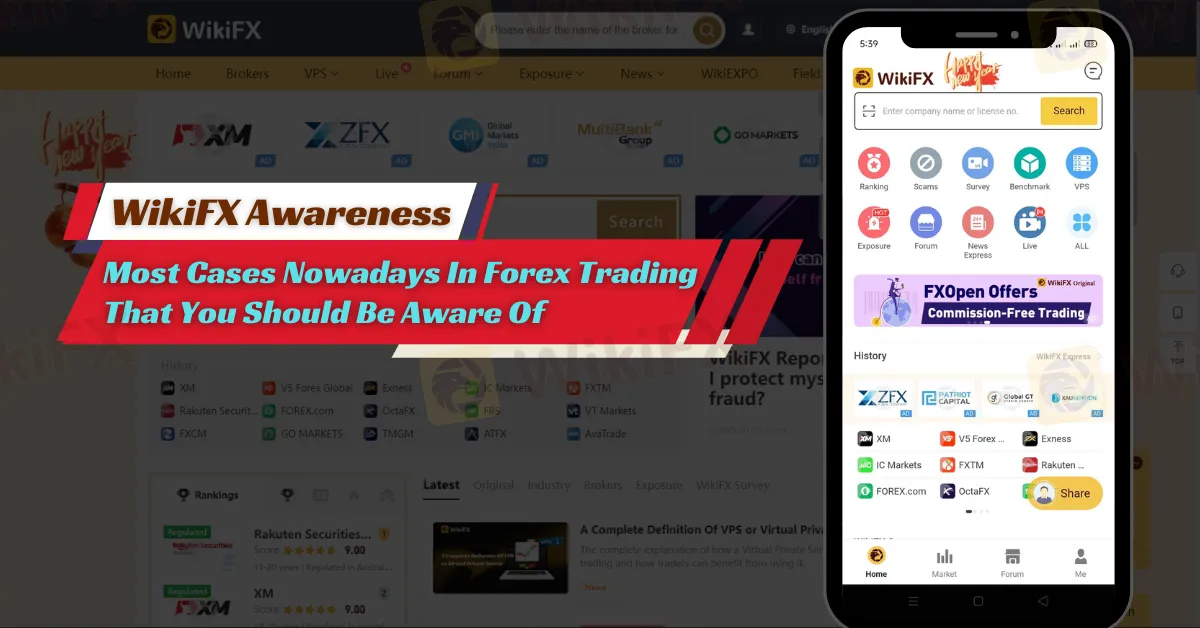简体中文
繁體中文
English
Pусский
日本語
ภาษาไทย
Tiếng Việt
Bahasa Indonesia
Español
हिन्दी
Filippiiniläinen
Français
Deutsch
Português
Türkçe
한국어
العربية
WikiFX Awareness: Most Cases Nowadays In Forex Trading That You Should Be Aware Of
Abstract:A brief explanation of unauthorized brokers who were warned by a certain regulatory authority that they would most likely resume operations under a different name.

Unauthorized brokers are individuals or companies that are not licensed or regulated by a regulatory authority. They may be operating illegally or may not have the proper credentials to provide financial services. A regulatory authority, such as the Securities and Exchange Commission (SEC), the Commodity Futures Trading Commission (CFTC), or the Financial Conduct Authority (FCA), may issue warnings or take action against these brokers to protect consumers from fraud or other financial harm. However, it is possible that these unauthorized brokers may continue to operate by using different names or by moving to different jurisdictions, making it difficult for consumers to identify and avoid them. It is important for individuals to conduct due diligence and research any potential broker or financial advisor before investing any money with them.
What are the most important things to do to prevent this from happening?
There are several important steps you can take to avoid falling victim to an unauthorized broker:
Verify the broker's credentials: Always check to see if a broker is registered and licensed with a regulatory authority. You can do this by checking the SEC's Investor.gov website or the National Futures Association's (NFA) Background Affiliation Status Information Center (BASIC).
Research the broker's background: Look for any red flags in the broker's background, such as a history of customer complaints or regulatory actions. You can also check the broker's record with the Financial Industry Regulatory Authority (FINRA) or the NFA.
Investigate the broker's references: Contact the broker's references and ask about their experiences. Be wary of any broker who is unwilling to provide references or who only provides you with positive testimonials.
Be skeptical of unsolicited offers: Be wary of unsolicited offers of investment opportunities, especially if they come from an unfamiliar source. These may be attempts to scam you out of your money.
Be cautious of high-pressure tactics: Be cautious of any broker who uses high-pressure tactics to persuade you to invest, such as insisting that you make a decision quickly or threatening that the opportunity will disappear if you don't act fast.
Avoid offshore brokerages: Be particularly careful of offshore brokerages, which may be operating outside of the jurisdiction of regulatory authorities.
By doing these things, you have a better chance of not getting scammed by an unlicensed broker.
Use the WikiFX App more frequently to avoid falling victim to fraudulent brokers, or contact the WikiFX Support team for assistance in locating a suitable broker.

Disclaimer:
The views in this article only represent the author's personal views, and do not constitute investment advice on this platform. This platform does not guarantee the accuracy, completeness and timeliness of the information in the article, and will not be liable for any loss caused by the use of or reliance on the information in the article.
Read more

The Ultimate Guide to Automated Forex Trading in 2025
Modern markets are revolutionized by automated trading systems, which now execute 70-85% of all transactions. These advanced automated trading software solutions, commonly called trading robots or Expert Advisors (EAs), leverage algorithmic precision for automatic trading across forex, stocks, and commodities 24/7. By removing emotional interference and executing trades in microseconds, auto forex trading platforms create fair opportunities for all market participants. For those new to automated trading for beginners, these systems provide disciplined, backtested strategies while significantly reducing manual effort.

Anti-Scam Groups Urge Tougher Action on Fraudsters in UK
Anti-scam groups demand tougher police action on fraudsters as UK fraud rates surge 19%, targeting millions in a penalty-free crime spree exposed by a $35m scam leak.

Will natural disasters have an impact on the forex market?
The forex market is known for its rapid responses to global events, but the influence of natural disasters, such as earthquakes and typhoons, can be less straightforward. While headlines may scream about catastrophic damage and economic disruption, the long-term effects on currency values often depend on a blend of immediate shock and underlying economic fundamentals.

Philippines Deports 29 Indonesians Linked to Online Scam Syndicate in Manila
Online scam groups in the Philippines trick Filipinos into gambling and love scams, from Manila to Bacolod, causing trafficking and pain as police fight back.
WikiFX Broker
Latest News
How Crypto Trading Transforms FX and CFD Brokerage Industry
UK would not hesitate to retaliate against US tariffs - No 10 sources
FCA Warns Against 10 Unlicensed or Clone Firms
CySEC Warns Against 14 Unlicensed Investment Websites
Top Currency Pairs to Watch for Profit This Week - March 31, 2025
Will natural disasters have an impact on the forex market?
Philippines Deports 29 Indonesians Linked to Online Scam Syndicate in Manila
Navigating the Intersection of Forex Markets, AI Technology, and Fintech
Exposed: Deceptive World of Fake Trading Gurus – Don’t Get Fooled!
AI-Powered Strategies to Improve Profits in Forex Trading
Currency Calculator







